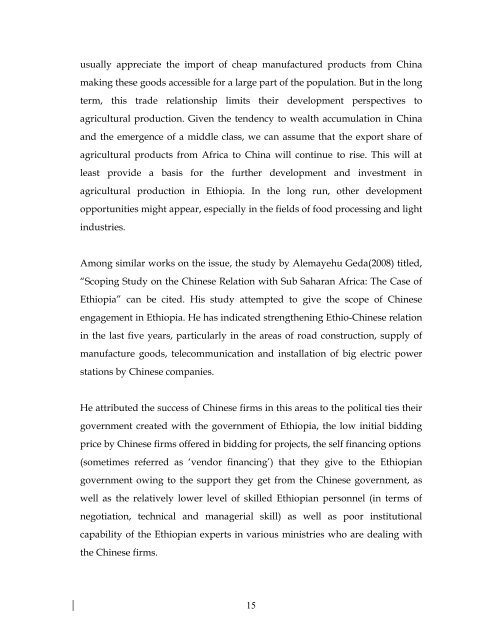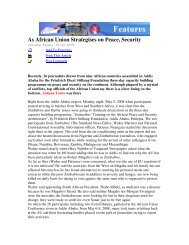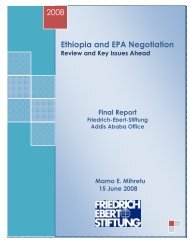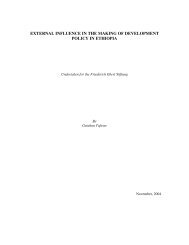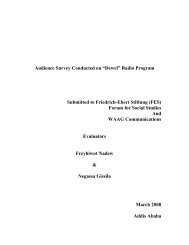China and India and Ethiopia final report - FES Ethiopia
China and India and Ethiopia final report - FES Ethiopia
China and India and Ethiopia final report - FES Ethiopia
Create successful ePaper yourself
Turn your PDF publications into a flip-book with our unique Google optimized e-Paper software.
usually appreciate the import of cheap manufactured products from <strong>China</strong>making these goods accessible for a large part of the population. But in the longterm, this trade relationship limits their development perspectives toagricultural production. Given the tendency to wealth accumulation in <strong>China</strong><strong>and</strong> the emergence of a middle class, we can assume that the export share ofagricultural products from Africa to <strong>China</strong> will continue to rise. This will atleast provide a basis for the further development <strong>and</strong> investment inagricultural production in <strong>Ethiopia</strong>. In the long run, other developmentopportunities might appear, especially in the fields of food processing <strong>and</strong> lightindustries.Among similar works on the issue, the study by Alemayehu Geda(2008) titled,“Scoping Study on the Chinese Relation with Sub Saharan Africa: The Case of<strong>Ethiopia</strong>” can be cited. His study attempted to give the scope of Chineseengagement in <strong>Ethiopia</strong>. He has indicated strengthening Ethio-Chinese relationin the last five years, particularly in the areas of road construction, supply ofmanufacture goods, telecommunication <strong>and</strong> installation of big electric powerstations by Chinese companies.He attributed the success of Chinese firms in this areas to the political ties theirgovernment created with the government of <strong>Ethiopia</strong>, the low initial biddingprice by Chinese firms offered in bidding for projects, the self financing options(sometimes referred as ‘vendor financing’) that they give to the <strong>Ethiopia</strong>ngovernment owing to the support they get from the Chinese government, aswell as the relatively lower level of skilled <strong>Ethiopia</strong>n personnel (in terms ofnegotiation, technical <strong>and</strong> managerial skill) as well as poor institutionalcapability of the <strong>Ethiopia</strong>n experts in various ministries who are dealing withthe Chinese firms.15


